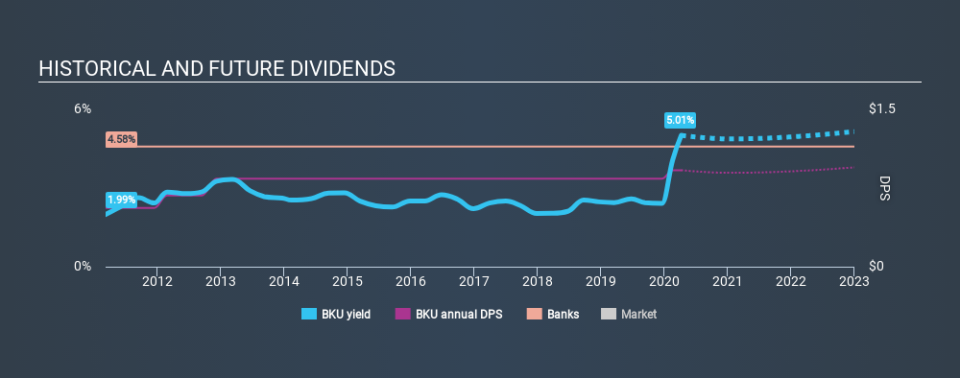Should You Buy BankUnited, Inc. (NYSE:BKU) For Its Upcoming Dividend In 4 Days?

BankUnited, Inc. (NYSE:BKU) stock is about to trade ex-dividend in 4 days time. Investors can purchase shares before the 13th of April in order to be eligible for this dividend, which will be paid on the 30th of April.
BankUnited's next dividend payment will be US$0.23 per share, on the back of last year when the company paid a total of US$0.84 to shareholders. Based on the last year's worth of payments, BankUnited has a trailing yield of 5.0% on the current stock price of $18.37. Dividends are a major contributor to investment returns for long term holders, but only if the dividend continues to be paid. So we need to investigate whether BankUnited can afford its dividend, and if the dividend could grow.
See our latest analysis for BankUnited
Dividends are typically paid from company earnings. If a company pays more in dividends than it earned in profit, then the dividend could be unsustainable. That's why it's good to see BankUnited paying out a modest 27% of its earnings.
When a company paid out less in dividends than it earned in profit, this generally suggests its dividend is affordable. The lower the % of its profit that it pays out, the greater the margin of safety for the dividend if the business enters a downturn.
Click here to see the company's payout ratio, plus analyst estimates of its future dividends.
Have Earnings And Dividends Been Growing?
Stocks in companies that generate sustainable earnings growth often make the best dividend prospects, as it is easier to lift the dividend when earnings are rising. If earnings decline and the company is forced to cut its dividend, investors could watch the value of their investment go up in smoke. With that in mind, we're encouraged by the steady growth at BankUnited, with earnings per share up 10.0% on average over the last five years.
The main way most investors will assess a company's dividend prospects is by checking the historical rate of dividend growth. In the past nine years, BankUnited has increased its dividend at approximately 5.7% a year on average. We're glad to see dividends rising alongside earnings over a number of years, which may be a sign the company intends to share the growth with shareholders.
Final Takeaway
From a dividend perspective, should investors buy or avoid BankUnited? It has been growing its earnings per share somewhat in recent years, although it reinvests more than half its earnings in the business, which could suggest there are some growth projects that have not yet reached fruition. In summary, BankUnited appears to have some promise as a dividend stock, and we'd suggest taking a closer look at it.
So while BankUnited looks good from a dividend perspective, it's always worthwhile being up to date with the risks involved in this stock. For instance, we've identified 3 warning signs for BankUnited (1 is potentially serious) you should be aware of.
We wouldn't recommend just buying the first dividend stock you see, though. Here's a list of interesting dividend stocks with a greater than 2% yield and an upcoming dividend.
If you spot an error that warrants correction, please contact the editor at editorial-team@simplywallst.com. This article by Simply Wall St is general in nature. It does not constitute a recommendation to buy or sell any stock, and does not take account of your objectives, or your financial situation. Simply Wall St has no position in the stocks mentioned.
We aim to bring you long-term focused research analysis driven by fundamental data. Note that our analysis may not factor in the latest price-sensitive company announcements or qualitative material. Thank you for reading.

 Yahoo Finance
Yahoo Finance 
